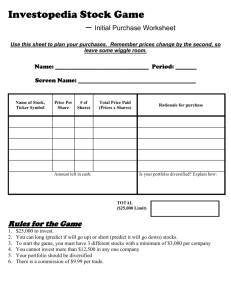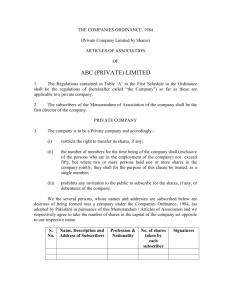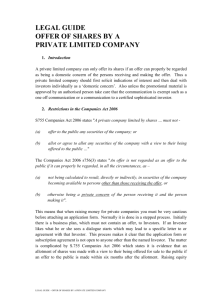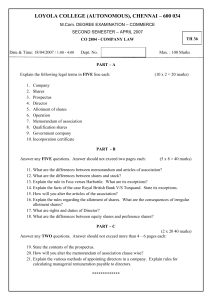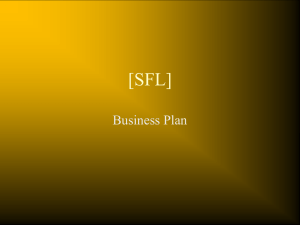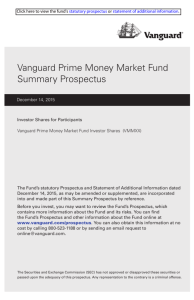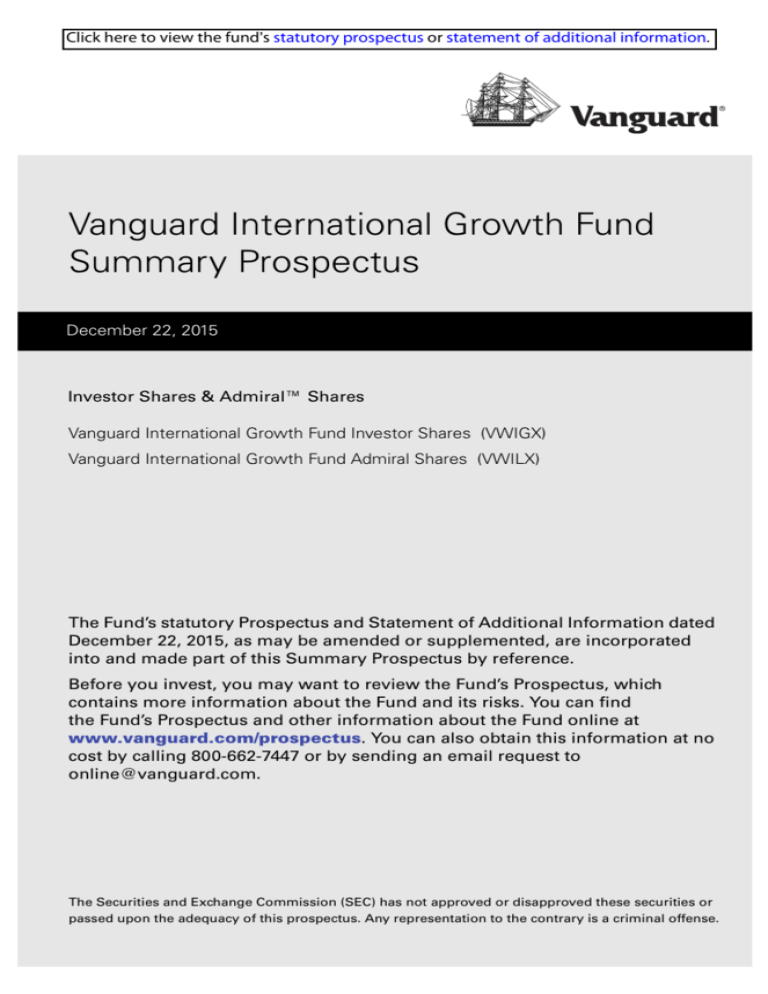
Click here to view the fund's statutory prospectus or statement of additional information.
Vanguard International Growth Fund
Summary Prospectus
December 22, 2015
Investor Shares & Admiral™ Shares
Vanguard International Growth Fund Investor Shares (VWIGX)
Vanguard International Growth Fund Admiral Shares (VWILX)
The Fund’s statutory Prospectus and Statement of Additional Information dated
December 22, 2015, as may be amended or supplemented, are incorporated
into and made part of this Summary Prospectus by reference.
Before you invest, you may want to review the Fund’s Prospectus, which
contains more information about the Fund and its risks. You can find
the Fund’s Prospectus and other information about the Fund online at
www.vanguard.com/prospectus. You can also obtain this information at no
cost by calling 800-662-7447 or by sending an email request to
online@vanguard.com.
The Securities and Exchange Commission (SEC) has not approved or disapproved these securities or
passed upon the adequacy of this prospectus. Any representation to the contrary is a criminal offense.
Investment Objective
The Fund seeks to provide long-term capital appreciation.
Fees and Expenses
The following table describes the fees and expenses you may pay if you buy and hold
Investor Shares or Admiral Shares of the Fund.
Shareholder Fees
(Fees paid directly from your investment)
Investor Shares Admiral Shares
Sales Charge (Load) Imposed on Purchases
None
None
Purchase Fee
None
None
Sales Charge (Load) Imposed on Reinvested Dividends
None
None
Redemption Fee
None
None
Account Service Fee (for certain fund account balances below
$10,000)
$20/year
$20/year
Annual Fund Operating Expenses
(Expenses that you pay each year as a percentage of the value of your investment)
Investor Shares Admiral Shares
Management Fees
0.43%
0.30%
12b-1 Distribution Fee
None
None
Other Expenses
0.04%
0.04%
Total Annual Fund Operating Expenses
0.47%
0.34%
1
Examples
The following examples are intended to help you compare the cost of investing in the
Fund’s Investor Shares or Admiral Shares with the cost of investing in other mutual
funds. They illustrate the hypothetical expenses that you would incur over various
periods if you invested $10,000 in the Fund’s shares. These examples assume that the
Shares provide a return of 5% each year and that total annual fund operating expenses
remain as stated in the preceding table. You would incur these hypothetical expenses
whether or not you redeem your investment at the end of the given period. Although
your actual costs may be higher or lower, based on these assumptions your costs
would be:
1 Year
3 Years
5 Years
10 Years
Investor Shares
$48
$151
$263
$591
Admiral Shares
$35
$109
$191
$431
Portfolio Turnover
The Fund pays transaction costs, such as commissions, when it buys and sells
securities (or “turns over” its portfolio). A higher portfolio turnover rate may indicate
higher transaction costs and may result in more taxes when Fund shares are held in a
taxable account. These costs, which are not reflected in annual fund operating
expenses or in the previous expense examples, reduce the Fund’s performance.
During the most recent fiscal year, the Fund’s portfolio turnover rate was 29% of the
average value of its portfolio.
Principal Investment Strategies
The Fund invests predominantly in the stocks of companies located outside the
United States and is expected to diversify its assets in countries across developed
and emerging markets. In selecting stocks, the Fund’s advisors evaluate foreign
markets around the world and choose large-, mid-, and small-capitalization companies
considered to have above-average growth potential. The Fund uses multiple
investment advisors.
2
Principal Risks
An investment in the Fund could lose money over short or even long periods. You should
expect the Fund’s share price and total return to fluctuate within a wide range, like the
fluctuations of global stock markets. The Fund is subject to the following risks, which
could affect the Fund’s performance:
• Investment style risk, which is the chance that returns from non-U.S. growth stocks
and, to the extent that the Fund is invested in them, small- and mid-cap stocks, will
trail returns from global stock markets. Historically, non-U.S. small- and mid-cap stocks
have been more volatile in price than the large-cap stocks that dominate the global
markets, and they often perform quite differently.
• Stock market risk, which is the chance that stock prices overall will decline. Stock
markets tend to move in cycles, with periods of rising prices and periods of falling
prices. The Fund’s investments in foreign stocks can be riskier than U.S. stock
investments. Foreign stocks tend to be more volatile and less liquid than U.S. stocks.
The prices of foreign stocks and the prices of U.S. stocks may move in opposite
directions.
• Country/regional risk, which is the chance that world events—such as political
upheaval, financial troubles, or natural disasters—will adversely affect the value of
securities issued by companies in foreign countries or regions. Because the Fund
may invest a large portion of its assets in securities of companies located in any one
country or region, including emerging markets, the Fund’s performance may be hurt
disproportionately by the poor performance of its investments in that area. Country/
regional risk is especially high in emerging markets.
• Currency risk, which is the chance that the value of a foreign investment, measured in
U.S. dollars, will decrease because of unfavorable changes in currency exchange rates.
Currency risk is especially high in emerging markets.
• Manager risk, which is the chance that poor security selection will cause the Fund to
underperform relevant benchmarks or other funds with a similar investment objective. In
addition, significant investment in the financial sector subjects the Fund to
proportionately higher exposure to the risks of this sector.
An investment in the Fund is not a deposit of a bank and is not insured or guaranteed
by the Federal Deposit Insurance Corporation or any other government agency.
3
Annual Total Returns
The following bar chart and table are intended to help you understand the risks of
investing in the Fund. The bar chart shows how the performance of the Fund‘s
Investor Shares has varied from one calendar year to another over the periods shown.
The table shows how the average annual total returns of the share classes presented
compare with those of relevant market indexes, which have investment
characteristics similar to those of the Fund. Returns for the indexes shown are
adjusted for withholding taxes. Keep in mind that the Fund’s past performance (before
and after taxes) does not indicate how the Fund will perform in the future. Updated
performance information is available on our website at vanguard.com/performance or
by calling Vanguard toll-free at 800-662-7447.
Annual Total Returns — Vanguard International Growth Fund Investor Shares1
2005
2006
2007
2008
60%
2010
2011
2012
2013
20.01
22.95
2014
41.63
40%
20%
2009
15.00
25.92
15.98
15.66
0%
-20%
-13.68
-5.63
-40%
-60%
-44.94
1 The year-to-date return as of the most recent calendar quarter, which ended on September 30, 2015, was –7.20%.
During the periods shown in the bar chart, the highest return for a calendar quarter
was 27.03% (quarter ended June 30, 2009), and the lowest return for a quarter was
–23.22% (quarter ended December 31, 2008).
4
Average Annual Total Returns for Periods Ended December 31, 2014
1 Year
5 Years
10 Years
Vanguard International Growth Fund Investor Shares
Return Before Taxes
–5.63%
6.81%
6.18%
Return After Taxes on Distributions
–6.18
6.44
5.31
Return After Taxes on Distributions and Sale of Fund Shares
–2.83
5.39
5.01
–5.51%
6.95%
6.35%
MSCI ACWI ex USA Index
–3.87%
4.43%
5.13%
Spliced International Index
–3.87
3.85
3.70
Vanguard International Growth Fund Admiral Shares
Return Before Taxes
Comparative Indexes
(reflect no deduction for fees or expenses)
Actual after-tax returns depend on your tax situation and may differ from those shown
in the preceding table. When after-tax returns are calculated, it is assumed that the
shareholder was in the highest individual federal marginal income tax bracket at the
time of each distribution of income or capital gains or upon redemption. State and
local income taxes are not reflected in the calculations. Please note that after-tax
returns are shown only for the Investor Shares and may differ for each share class.
After-tax returns are not relevant for a shareholder who holds fund shares in a taxdeferred account, such as an individual retirement account or a 401(k) plan. Also,
figures captioned Return After Taxes on Distributions and Sale of Fund Shares may be
higher than other figures for the same period if a capital loss occurs upon redemption
and results in an assumed tax deduction for the shareholder.
5
Investment Advisors
Baillie Gifford Overseas Ltd. (Baillie Gifford)
M&G Investment Management Limited (M&G)
Schroder Investment Management North America Inc. (Schroders)
Portfolio Managers
James K. Anderson, Partner of Baillie Gifford & Co., which is the 100% owner of Baillie
Gifford, and Head of Global Equities. He has managed a portion of the Fund since 2003
(co-managed since 2013).
Kave Sigaroudinia, Partner of Baillie Gifford & Co., which is the 100% owner of Baillie
Gifford. He has co-managed a portion of the Fund since 2013.
Charles Anniss, CFA, Portfolio Manager at M&G. He has managed a portion of the
Fund since 2014.
Simon Webber, CFA, Portfolio Manager at Schroders. He has managed a portion of the
Fund since 2009.
Purchase and Sale of Fund Shares
You may purchase or redeem shares online through our website (vanguard.com), by
mail (The Vanguard Group, P.O. Box 1110, Valley Forge, PA 19482-1110), or by telephone
(800-662-2739). The minimum investment amount required to open and maintain a
Fund account for Investor Shares or Admiral Shares is $3,000 or $50,000, respectively.
The minimum investment amount required to add to an existing Fund account is
generally $1. Institutional, financial intermediary, and Vanguard retail managed clients
should contact Vanguard for information on special eligibility rules that may apply to
them regarding Admiral Shares.
Tax Information
The Fund’s distributions may be taxable as ordinary income or capital gain. If you
are investing through a tax-deferred retirement account, such as an IRA, special tax
rules apply.
Payments to Financial Intermediaries
The Fund and its investment advisors do not pay financial intermediaries for sales of
Fund shares.
Click here to view the fund's statutory prospectus or statement of additional information.
Vanguard International Growth Fund Investor Shares—Fund Number 81
Vanguard International Growth Fund Admiral Shares—Fund Number 581
CFA® is a registered trademark owned by CFA Institute.
© 2015 The Vanguard Group, Inc. All rights reserved.
Vanguard Marketing Corporation, Distributor.
SP 81 122015


